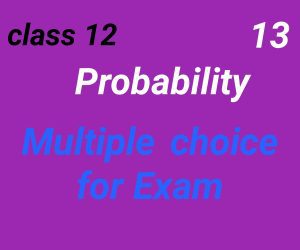Question:-
A and B throw a die alternatively till one of them gets ‘6’ and win the game. Find their respective probabilities of winning, If A starts first
Solution:
Let S denote the success(getting a ‘6’) and F denote the failure(Not getting a ‘6’).
Thus,
![]()
P(A wins in the first throw) ![]()
A gets the third throw, when the first throw by A and second throw by B result into failures.
Therefore,
P(A wins in the third throw) ![]()
![]()
![]()
P(A wins in the 5th throw)![]()
![]()
![]()
![]()
Hence,
![]()
This series is Geometric progression of infinite term
![]()
![]()
![]()
![]()
![]()
![]()
![]()
![]()
![]()
Question:-
Two balls are drawn at random one by one with replacement from an urn containing equal number of red balls and green balls. Find the probability distribution of number of red balls. Also, find the mean of the random variable.
Solution:- For solution click here
